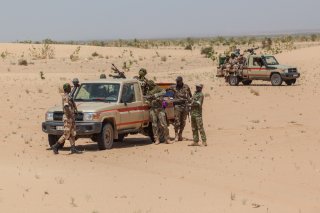Why the Niger Coup Matters
Washington’s security-focused Sahel policy is collapsing.
Why should a coup in one of the world’s poorest countries be a serious concern for the United States?
On July 25th, members of the special unit of Niger’s presidential guards detained President Mohamed Bazoum, prompting an outpouring of condemnation from leaders around the world.
Hours later, a group of soldiers appeared on national television, claiming to have overthrown the current government. They suspended all government institutions, closed land and air borders, and instituted a nationwide curfew.
General Omar Tchiani, commander of the presidential guards, appointed himself as the leader of the country’s new military government. While little is known about Tchiani and his motivations for the coup, there have been several rumors that Bazoum was preparing to fire him. Interestingly enough, Tchiani allegedly led the unit that successfully prevented a coup in Niger two years ago when a military unit tried to seize the presidential palace days before Bazoum was sworn into office.
Sadly, the military takeover in Niger is just the latest in a succession of African coups that have contributed to rising instability and the spread of jihadist groups. Since 2020, the continent has seen a total of seven military coups in Mali, Burkina Faso, Guinea, Chad, and Sudan. In many cases, the most senior military leaders have not led these regime changes. Instead, colonels in command of elite presidential guards or special forces units have seized power. In at least five cases, coup leaders have even received training at U.S. military institutions.
And while the spate of coups is worrying, the latest in Niger is particularly concerning. Niger has avoided a violent overthrow in recent years and maintained a relatively healthy democracy in an increasingly unstable West Africa. Since entering office—during the country’s first peaceful transition of power since gaining independence in 1960—Bazoum has been one of the most reliable U.S. allies in the region and has even avoided deepening cooperation with Moscow. Underscoring the importance of the U.S.-Niger relationship, Secretary of State Antony Blinken visited Niger earlier this year, praising Bazoum's government and announcing $150 million in new economic aid. However, with his removal, the status of Niger’s relationship with the West is imperiled, and it is unclear when or if Niger will return to a democratic government. The imminent departure of American embassy staff and European nationals is not a reassuring sign.
Militarily, Niger has acted as a critical base for Western forces fighting Al Qaeda and Islamic State-linked groups in both the Sahel and Lake Chad region. Currently, there are over 1,000 U.S. service personnel and an estimated 1,500 French forces in-country. Many were transferred to Niger after withdrawal from other African nations that cut ties with Western security partners. Moreover, the U.S. has used bases in Niger to operate drones for counterterrorism missions throughout the Sahel region. While the status of these American and French forces is still undetermined, losing Niger as a base of operations in West Africa would be a major blow to the fight against jihadist groups.
But perhaps the most concerning outcome of the coup could be a deepening of Russia’s footprint on the African continent through its Wagner paramilitary outfit. Shortly after the coup, Wagner Group leader Yevgeny Prigozhin purportedly celebrated the coup on an affiliated Telegram channel, describing it as a long overdue liberation from colonizers, and appeared to offer his mercenary group’s services.
While many have questioned the future of Wagner in Africa after Prigozhin’s attempted coup in Moscow, the force’s footprint—and therefore Russia’s influence—is largely unchanged. Prigozhin has even met with Russian president Vladimir Putin and was seen rubbing elbows with African leaders at this week’s Africa-Russia summit in St Petersburg. So, with Wagner’s presence on the continent seemingly secure, Prigozhin could easily replicate his Mali and Central African Republic (CAR) operations in Niger by offering security and counterterrorism support in exchange for mining rights to Niger’s rich natural resources.
If there’s any lesson for Washington to learn from Bazoum’s ouster, it is that even close Western partners like Niger are vulnerable to political instability. Providing security assistance is not enough. Washington must provide broader support to address the root causes of unrest in these countries, or else risk a much more costly outcome: jihadist groups and Russia leveraging the instability for their own purposes.
Emily Milliken is the Senior Vice President and Lead Analyst at Askari Associates, LLC.
Image: Shutterstock.

